#but i need a watsonian reason too
Explore tagged Tumblr posts
Text
I am....so curious about the backstory behind some of the MVs. But Nanatsuiro REALiZE's one has me even more curious because essentially the mv is them all meeting in university(?) and Riku's character suddenly leaving but the parting being a joyful one as they remember they're under one same sky. And like.....is this supposed to be Riku's goodbye MV for the future or what does it MEAN?
#i also want to know the story behind the POLiCY (why are i7 songs formatted like that - i know why but still)#same with the other groups' mvs btw but nanatsuiro realize has me in some kind of grip with the sk8 and goodbye vibes#idolish7#fandom spamdom#note's notes#......ive been i7 posting for like a month now i think someone needs to rescue me#i dont think i usually make original posts this much#OH YEAH WE CANT FORGET HOW MEMORIES MELODIES HAS TSUMUGI FEATURED#like i remember reading one of the manga stories where they censored tsumugi's face and replaced it with rikus (rip fly away)#so i also want to know how that happened#like ok doylian explanation i get why because shes the protagonistish....#but i need a watsonian reason too
12 notes
·
View notes
Text
Being someone who read Under The Red Hood and came out with the firm belief that, for Jason, it's not about killing Joker, it's about Jason wanting proof Batman would choose him over the Joker (bc shelia chose the joker). Makes seeing any other media where it's all about just wanting the Joker dead is a teeny bit frustrating. to be honest
Jason could've killed the Joker himself, really, really easily. Jason kidnaps the Joker before the confrontation. I can't open my comic for a reference right now, but it felt like he had the Joker for quite a bit before the confrontation. He had him. He beat him up with a crowbar. He had every single opportunity to kill the Joker himself, but he didn't because that wasn't his goal. Make no mistake, he did plan for the Joker to be dead by the end of it, but do you see what im trying to say here
Edit: If I knew this post was gonna get 1000+ notes I would've tried to word it better or something, this was a rant I made on the way to the grocery store 😭
It's not about making Batman kill either. When Batman says he won't kill, Jason adjusts and goes, 'Let ME kill the Joker or kill me to stop me' instead. The test is all about Batman choosing him. The whole final confrontation is Jason's first death again. The parent, The Joker, and the explosives. It even ends with Jason unable to move as a bomb goes off right next to him again because the parent didn't choose Jason. And instead tried finding an option that'd benefit them and (consequencely) letting the Joker walk, again, lol, lmao <-in agony
#the final confrontation was basically his first death again#and YES he Does want the Joker dead#and it would've been really really nice if Batman was the one who did it#but when batman made it clear he wouldn't kill the joker. Jason easily switched to saying “LET me kill the joker” to accommodate#because he Wanted batman to pass his test#he gave a test to dick too. and technically tim but it wasnt the family test it was a different one so it doesnt rly count#AFTER utrh and the reveal and the batarang you can go hog wild about it. i care less about it then#granted i do believe they make jason more scared of the joker after it at some point#i guess because hes a bit too willing to kill the joker and ive heard jason wasnt meant to live after utrh#my watsonian explain for that is he was so fixated on his plan he cpuld override his fear. or maybe the pit. either work#i prefer the fixation bc i dont like the explanation that the pit was the /only/ reason he could get all plan together and done#BUT THATS UNRELATED!!!#dc stop putting the joker in jason stories im begging you please please please. lock him in a vault for the next 20 years or something#it Cpuld be good and i understand. but also. after so long of people that dont know or go for jasons need for family and parents#that love him and he can trust#the joker starts to feel like?? hm. words. a cop out? oh haha its that guy that killed him woagh hes here#i bet you dont even know that jaybin got beat until unconsciousness by an angry mob#while asking batman to save him only for batman to have to walk away#anwya. where was i going with this#i think i got off topic#jason todd#dc comics#batman#ADDED AN EDIT. SORRY. this post has been haunting me it keeps me awake. what if people misunderstand#they cant read my tags where i ramble more depth. thisbis the only option#EDIT EDIT: hiii#removed the sentence abt jason having the joker for several days bc i misremembered some things#go read its-your-mind 's addition instead also#ok no more i wont edit this post anymore i promise
3K notes
·
View notes
Text
thinking about Lucanis again (always). and how so much of his narrative boils down to the theme of "control". and of course also about how this applies to the Rook x Lucanis relationship.
like the first scenes with him in the game are, in theory, about freeing him from the Ossuary (although he seems to have an escape attempt already in progress at the time, they certainly weren't just letting him keep those knives on him for enrichment purposes, Rook just provided an opening/distraction he could take advantage of and crucially Rook has A Way Out of the whole place not just a cell). but ACTUALLY the purpose it to put him right into a new contract for Us, one set up by his own grandmother and first talon no less, and the person he has the MOST trouble saying no to. He's escaped torture and the Venatori for sure but he still isn't free, which I think is part of what leads to Spite's confusion/the Inner Demons plotline. He agrees to the contract but you can tell it's in many parts out of a sense of duty/mourning vs something he actively wants to do for himself. And then the FIRST real heartfelt conversation you have with him, where he tells you "even before I was captured, my life was not really my own. So much had been determined for me." But he's chaffaing at that! He thinks "to live truly is to live fully" and so directly tells you he doesn't think he's lived a life true to himself. He's been constantly smothered by the weight of expectations around him, even though he longs for more.
And then once you get him to the Lighthouse you see how this Big lack of control in his life comes out as all these smaller frustrations. He's terrified of sleeping and downing 11 cups of coffee per hour because sleeping means he will lose control to Spite, even though Spite is shown to flee rather than fight when he feels threatened, and once calmed down, is more drawn to just benign curiosity/mischief than anything actively malicious. Like if Lucanis loses control and sleeps for a few hours he is not going to wake up surrounded by bloodshed, he's going to wake up to a belly full of candle wax because he wouldn't like Spite taste one while they were awake. Which is the other half of this--he constantly denying Spite's impulses for reasons that in some ways make sense (HE doesn't want to eat candles), but not in a way that's actually satisfying to either of them (why not just take a bite, chew for a bit, and spit it out so Spite knows they kind of suck actually?). But he CAN say no to Spite and so he does. Over and over. Spite's one of the few people he can deny things without feeling bad about it, because it's HIS body he doesn't like that has to share now (<- this is what he thinks about it at first anyway, but he's wrong, it's both of theirs and it's useless to try to hold those kind of boundaries forever. but the "no its mine" spiteful instinct is very beautifully ironic and reflective of them both and their early relationship).
And personally I think this is where his fear of his own desires and intimacy is coming from, at the root. I don't think he's afraid of the concept of being in a romance or having feelings (even if they're unusual and rare for him, this is by no means incompatible with him being demi) but I DO think he is afraid of the kind of power it gives people over you. Getting something you want means there's something else that can be taken away. Admitting your desire means the other person has the opportunity to deny that. The more you have, the more you have to lose, and he has lost again and again and again in his life--his parents, his childhood to the crows, his independence, even his future--he doesn't aspire to be first Talon but he knows the rumors. He knows his grandmother wanted it for him, not Illario. His life path has been laid out for him by others and up to this point he has simply been going along with it anyway, even though it bothers him. He COULD argue and fight Caterina and push for Illario who actually wants the job to be First Talon instead, but from The Wigmaker Job we know he doesn't. He just ignores it and pretends maybe it won't happen, without him having to do any of the work. Which is why in the end Illario is the one who has to make a move about it (and even warns Lucanis of this!!!!). Lucanis KNOWS all this makes him a target but is neither taking charge or getting off of the train tracks, just closes his eyes.
And I think THIS context is what makes the almost kiss scene in the pantry make more sense to me. Rather than being afraid of having feelings (and then NEVER addressing this in game with a Rook who pursues him anyway) or not knowing how to finish what he's started via crow seduction training, it's more like this is a pivotal moment where he can actively choose to step off the planned path of be given a job -> kill the gods -> enact revenge -> go home. even if he doesn't at that point realize that a relationship with Rook could be something that lasts long-term, the very act of doing something just for himself is what's foreign and scary and hard. It's that first step off the tracks, and even if he were to keep walking in the same direction, it means he's making a choice about it. he's accepting that one way or another it IS in his power to go along with everyone else's plans or not. Hence the hesitation, and drawing back, and needing to clear his head.
And then the rest of Rook's role in his narrative IS about giving him more and more control for himself. Inner Demons, dealing with Illario, his questlines move less towards revenge and more towards just... not being locked into one fate. Which of course Caterina comes back and immediately tries to overturn by declaring him First Talon after all, even though she and him and everyone else knows she's not ACTUALLY ready to give up her rule/decision making power yet. Which in a way is maddening because cmon I did all this work here so this sad man could have some agency in his own life just to watch him get sucked right back in (which, at least we get many directions to headcanon from here), but there's no denying that THIS version of Lucanis at least is actually going in with his eyes open now. THIS Lucanis has had a taste of life outside the Crows, and seen the politics and power dynamics in other places/organizations, and finally has emotional ties to the big picture state of the world now, both in relationship and friendship paths with Rook. He's not just hyper focused on each contract as it's given to him now, he's looking at the whole thing.
Anyway of course the beautiful culmination of all this within the romance is the lighthouse scene with Rook, where he finally is willing to let himself be vulnerable (emotionally and physically), and fall asleep without fear of what Spite's going to do in the meanwhile. He also (depending on dialogue choice) finally talks about his feelings directly with you for the first time instead of in roundabout ways (the dessert being "not enough" is it really the dessert you mean, Lucanis. is it.). Even though he is STILL reluctant to verbally admit his feelings or let Rook share their own at this point, I think that's more a narrative choice about saving those last emotional dialogue options for the big final battle. but it is another point where he does have to stop just following along and ACTIVELY choose that yes, yes sometimes loving is worth the risk of losing it. Even if someone takes it away from you later, even if you don't survive it, sometimes the love alone makes it worth it.
I have like another 5000 words I could add into about how Spite ties into all this, about how having the demon in him is something he both fears AND how it forces him to acknowledge that actually yes he DOES share the same base feelings/instincts Spite does in terms of not wanting to be told what to do. And how this in a way is part of what gives him permission to act on it since he can no longer just shove it down out of sight. but this post is long enough already so i'm just going to take the rest of this and gnaw on it all day like a chew toy I guess.
anyway. AHG. it is kind of frustrating that the culmination of his arc seems to be "and then he got the job he never wanted anyway" but I do think at least all this prepares him for it in a way Caterina actively failed to actually do on her own. He NEEDED that step away from his straightforward path. Whether he stays first talon or not, and with or without rook as a romantic partner, he's finally been able to explore ideas outside the expectations of others.
#AND THEN of course how the whole control theme applies in terms of sex lmao. that man needs to be gently topped/dommed soooo bad#so much internalized shame and fear and he just wants someone who will see it & love him anyway#very much on theme to resent a thing (control) in everyday spaces but desire the inverse in the bedroom/forbidden spaces as a way to explor#it safely etc etc etc. fear of losing control vs desire to submit plus all the torture stuff mixed up in there oooohhh what a mess#themes of resistance etc etc You Get Me or you think im insane either is fine. anyway#dragon age: veilguard#dragon age: the veilguard#lucanis#lucanis dellamorte#rook x lucanis#rookanis#spite dellamorte#lucanisposting#datv spoilers#da4 spoilers#ramblings#dragon age#need to rip a pillow into shreds or somethign AHG im pacing around too fulll of Lucanis Thoughts this early in the day#this is usually a 3am hobby but im 12 hours early#but i think finally this is some watsonian reasoning that makes me more chill about the doyalist failures i have with the writing for him#this may be incomprehensible i did Not proofread it#jade plays dav#juniper x lucanis
290 notes
·
View notes
Text
Imagine you're Mr. Wu and your weird gay daughter runs away in tears after destroying some unespecified object while yelling about you ruining her life. Because you told her you'd be moving to another state. This is the last time you see your daughter in half a year, and when she comes back, she comes back... wrong. She's wearing a light leather armor, a fur-lined cape, and a green flower crown. She has two long scars, one alongside her spine and the other along her chest, the tissue around them covered in burn scars. Doctors say she shouldn't have survived. Doctors say she didn't. Yet she's right here, in front of you, hospital gown clinging to her small, fragile, trembling frame. She fidgets with her hands. Getting her to stay still has always been difficult, but now it seems impossible. She won't let go of her phone. She's always texting her two friends. When you take it away, she gets anxious. You always knew those damn phones cause kids to act weird, but your kid having a panic attack seems too extreme, even for her. Then again, she's always been odd. Nowadays, she wakes up crying and screaming almost every night, and you realize she's been stealing her phone from your bedside drawer every night to text her friends, returning it before you wake up. You catch her once and decide to give her that damn phone back. It's the only thing that calms her down, as if she were a baby with a pacifier. She spends her last weeks in LA clinging to her friends, having sleepovers and playing her weird board games with them. Everytime they drop her back at her house, there's an excessive amount of hugs and tears. But the moments when they call her, or when she leaves to meet with them, or when they show up at their door to pick her up... those are the only moments in which you see her happy. One of her friends, the rude and disobedient one, came back with a big scar on her face. She's been acting a lot nicer, though. The other one too. She acts a great deal more adult now. You doesn't know what happened or where your daughter went. She won't tell you. But you can tell this friendship is the only thing keeping her afloat right now. Maybe you know, deep down, that no one else would understand.
And then you decide to move anyway because fuck her amirite
#amphibia#marcy wu#my posts#so like what if marcy moving away was a proper tragedy#what if things were WORSE for her#what if *smashes marcy with a ROCK*#i realized that.#despite my parents being shitty (just found out literaly today my mom had doctors give me the wrong treatment because she assumed my body#would react the same way as hers. instead of doing what literally every doctor told her to do. now i need to get it fixed)#they still asked me how I felt about moving away to a different province when in like. 8.#like. oh right. this is something parents generally ask their kids about. instead of uprooting their entire lives out of nowhere.#marcy's situation is complicated in a narrative sense because#in order for her arc to work her departure must be dictated by morally neutral forces outside of her control#but her parents' decision seems very shitty with the context we're given. you COULD give context that justified their actions#i.e have them explain that they really do need this if they want marcy to go to college or some shit like that#but then it stops being Marcy vs. Forces of Nature#and it becomes Marcy vs. Her Dad (and she has to accept he's right in this one)#the show is clearly for a Marcy vs. Forces of Nature conflict (in this case it's the inevitability of change)#and in order to keep the antagonistic force abstract you CAN'T have her dad be a proper character#BUT. as a consequence -> Marcy has to give into the ''#the ''natural order'' which would be accepting her parents' power over her as natural and inevitable#it's not even like... accepting her parents are right or anything. just that their o#that their complete control of the situation and marcy's total powerlessness is natural and inevitable#and that's tragic! from a more watsonian ñerspective#perspective* : Marcy is sent back to her shitty parents and she just needs to learn how to deal with it away from her support system#the solution imo would have been to change the motivation behind her family moving away so that it's outside her parents' control too#it really has to be completely inevitable. i can't think of an alternative reason but it's just what it#it's what would fix this problem imo#it's a simple fix really
32 notes
·
View notes
Text
The Lightning Scene, How Azula Targeted Katara (of All People), and the Doylist Reason Why That Matters
Mention Zuko's sacrifice for Katara in Sozin's Comet Part 3 as part of a pro-Zutara talking point, and invariably you'll get a Pavlovian response of:
"But Zuko would have taken the lightning for anyone."
(Not to be confused with the similar-sounding Pavlovan response, which is "Zuko's sacrifice ain't shit compared to a mouth-watering, strawberry-topped meringue dessert"*, which is actually the only valid counter-argument to how the lightning scene is a bona fide Zutara treasure, but I digress.)
Now, I've talked in depth about how the lightning scene is framed far more romantically than it had any right to be, regardless of how you might interpret the subject on paper; this is an argument which I still stand by 100%. That Zuko would have gotten barbecued for anyone, and that he was at the stage of his arc where his royal kebab-ness represented his final act of redemption, doesn't change the fact that the animators/soundtrack artists decided to pull out all the stops with making this scene hit romantic film tropes bingo by the time it played out on screen.
(I mean, we stan.)
There's also a deeper level to this conundrum, a layer which creeps up on you when you're standing in your kitchen at night, the fridge door open in front of you, your hungry, sleep-deprived brain trying to decide on what to grab for a midnight snack, and quite inexcusably you're struck with the question: Okay, Zuko may indeed have taken the lightning for just anyone, but would Azula have shot the lightning at just anyone?
But there's yet a deeper layer to this question, that I don't recall ever seeing anyone discuss (though if somebody has, mea culpa). And that is: would you have written Zuko taking the lightning for anyone else?
Or in other words, who Zuko would have taken the lightning for is the wrong question to be asking; the question we ought to be asking is who Zuko should have taken the lightning for, instead.
Get your pens out, your Doylist hats on, and turn to page 394. It's time to think like an author for a hot minute.
(If you don't know what I mean by Watsonian vs. Doylist analyses, and/or if you need a refresher course, go have a skim of the first section of this 'ere post and then scoot your ass back to this one.)
So. You're the author. You've written almost the entirety of an animated series (look at you!!) and now you're at the climax, which you've decided is going to be an epic, hero-villain showdown. Classic. Unlike previous battles between these two characters, your hero is going to have a significant advantage in this fight - partly due to his own development as a hero at the height of his strength and moral conviction, and partly because your villain has gone through a bit of a Britney Spears 2007 fiasco, and isn't quite at the top of her game here. If things keep going at this pace, your hero is going to win the fight fairly easily - actually, maybe even too easily. That's okay though, you're a talented writer and you know just what will raise the stakes and give the audience a well-timed "oh shit" moment: you're going to have the villain suddenly switch targets and aim for somebody else. The hero will be thrown off his groove, the villain will gain the upper hand, the turns will have indubitably tabled. Villains playing dirty is the number 1 rule in every villain handbook after all, and each of the last two times your hero's braved this sort of fight he's faced an opponent who ended up fighting dishonourably, so you've got a lovely Rule of Three perfectly lined up for the taking. Impeccable. The warm glow of triumph shines upon you, cherubs sing, your English teachers clap and shed tears of pride. (Except for that one teacher you had in year 8 who hated everybody, but she's a right bitch and we're not talking about her today.)
Now here's the thing: your hero is a hero. Maybe he wasn't always a hero, but he certainly is one now. If the villain goes after an innocent third party, there's basically no-one your hero wouldn't sacrifice himself for. He's a hero! Heroes do be like that, it's kind of their thing. The villain could shoot a bolt of lightning at Bildad the Shuhite, and the only thing that'd stop our boy Redeemed Paladin Bravesoul McGee from shielding his foxy ass is the fact that Bildad the Shuhite has the audacity to exist in a totally different show (disgusten.)
But. You're holding the writer's pen. Minus crossover shenanigans you don't have the licensing or time-travel technology to achieve, you have full control over how this scene plays out. You get to decide which character to target to deliver the greatest emotional impact, the juiciest angst, the most powerful cinematic suspense. You get to decide whose life you'll put at risk, to make this scene the most intense spine-chilling heart-stopper it can possibly be.
This is the climax we're talking about, after all - now is not the time to go easy on the drama.
So.
Do you make the villain target just anyone?
Or do you make the villain target someone the hero cares about?
Perhaps, someone he cares about... a lot?
Maybe even, someone he cares about... more than anybody else?
You are the author. You are the God of this universe. You get to choose.
What would deliver the strongest punch?
If you happen to make the inadvisable decision of browsing through these tropes on TV tropes, aside from wasting the rest of your afternoon (you're welcome), you'll find that the examples listed are littered with threatened and dead love interests, and, well, there's a reason for that. For better or worse, romantic love is often portrayed by authors, and perceived by audiences, as a "true" form of love (often even, "the" true form of love). Which is responsible for the other is a chicken/egg situation, one I'm not going to go into for this post - and while I'm certainly not here to defend this perspective as objectively good, I do think it's worth acknowledging that it not only exists but is culturally rather ubiquitous. (If you're playing the love interest in a story with a hero v. a villain, you might wanna watch your back, is what I'm saying.)
Regardless of whether the vibe you're aiming for is romantic or platonic however, one thing is for certain: if you want maximum oomph, the way to achieve that is by making the villain go after the player whose death would hit the hero the hardest.
And like I said, this doesn't have to be played romantically (although it so often is). There are platonic examples in those trope pages, though it's also important to note that many of the platonic ones do show up in stories where a love interest isn't depicted/available/there's a strong "bromance" element/the hero is low-key ace - and keep in mind too that going that route sometimes runs a related risk of falling into queer-bait territory *coughJohnLockcough*
That said, if there is a canon love-interest available, one who's confessed her love for the hero, one who has since been imprisoned by the villain, one who can easily be written as being at the villain's disposal, and who could quite conveniently be whipped out for a mid-battle surprise round - you might find you have some explaining to do if you choose to wield your authorly powers to have the villain go after... idk, some other sheila instead.
(The fact that this ends up taking the hero out of the fight, and the person he sacrifices himself for subsequently throws herself into the arena risking life and limb to defeat the villain and rescue her saviour, also means the most satisfying way this plays out, narratively speaking, is if both of these characters happen to be the most important person in each other's lives - at least, as of that moment, anyway - but I think this post has gone on long enough, lol)
This is, by and large, a rebuttal post more than anything else, but the tl;dr here is - regardless of whether you want to read the scene as shippy or not, to downplay Zuko's sacrifice for Katara specifically as "not that deep™" because "Zuko would have taken the lightning for anyone anyway", suggests either that a) nobody should be reading into the implications of Katara being chosen as the person nearest and dearest to Zuko, so that putting her life in jeopardy can deliver the most powerful impact possible for an audience you'd bloody well hope are on the edge of their seats during the climax of your story or b) the writers made the inexplicable decision of having the villain threaten the life of... literally who the fuck ever, and ultimately landed on someone who's actually not all that important to the hero in the grand scheme of things - which is a cardinal writing sin if I ever saw one (even disregarding the Choice to then season it with mood lighting and sad violin music, on top of it all), and altogether something I'd be legitimately pissed about if my Zuko-OTP ship paired him with Mai, Sokka, or just about anybody else 😂
Most importantly c) I'm hungry, and I want snacks.
*The Aussies in the fandom will get this one. Everyone else can suffer in united confusion.
649 notes
·
View notes
Text
The Colors of Crowley
Black is the color Crowley uses to cover himself, red is the color that represents Crowley to himself, and yellow is the color that represents Crowley to Aziraphale. What each color symbolizes and how it's used give us important information about Crowley (and to some degree Aziraphale) and about the ineffable relationship.
I feel kind of dumb writing this post because I'm sure it's glaringly obvious to everyone else, but there's this Metro UK article of all things (the Metro is owned by the hardcore rightwing Daily Mail, btw, so please don't link to it) that mentions the red stitching on Crowley's gloves in 1867, and it made conscious some details I had only subconsciously noted, so fwiw to anybody else, here are my notes on the colors associated with Crowley in Good Omens and their significance in the context of the way each one is used.
I don't think we need to cover black-as-evil in Western color symbology. [And yet here's a long-ass paragraph about it anyway! --Ed.] Light:dark::good:evil has been a thing with Christianity since before Christianity was even Judaism. The Israelites picked it up from the Zoroastrians way back before YHWH had subsumed El as 'God,' which may have been before they were Israelites as well; I mean it was a LONG time ago. Good Omens has been using black and white to represent Hell and Heaven, respectively, long before the show. In the UK, the book was published in paperback with a choice of black or white cover with an illustration of the contrasting character in the contrasting color: Crowley illustrated in black, Aziraphale in white. The current hardcover is grey.
Crowley wears black, and the Bentley is black. At the metanarrative or authorial level this is obviously for the purposes of the black/white demon/angel contrast, but on the intra-narrative level, the Watsonian level, it's interesting to note that Crowley doesn't have to wear black. He's obviously not free to choose from the full color palette, but Furfur's shirt and sash are is dark emerald green, Dagon is in ultramarine (as befits a marine Elder God), and Shax has only been on Earth for four years before she's wearing head-to-toe oxblood. When she shows up later in battle dress she's got a lot of oxblood there, too. And yet Crowley wears black.

Authorial reasons aside, black suits Crowley for a couple intra-narrative reasons. For much of history, black was the most expensive color to dye and maintain in clothing, and as a result it has always been fashionable. And for several centuries in Christendom, wearing black was also a sign that you were in mourning, which was a social and religious obligation when someone close to you died. Whether you could wear other colors with it depended on how long ago that death had occurred.
Again: black is what Crowley chooses to cover himself, and as there is a sharp distinction between how Crowley presents himself to fulfill his obligations and who he thinks of himself as being, there is likewise a distinction between the colors that represent those two quantities as well.
Red is the color the show uses to represent Crowley to Crowley. The most obvious reason is his hair. This is another change from Book Omens, where Crowley is described as having hair that is "dark." A lot of fans in the UK hated the change when S1 came out because fans hate change and the British have a thing against gingers, but Crowley's red hair suits him better than dark imo because the Mother of Demons in Jewish religious literature, Lilith, is traditionally depicted with red hair. Red hair has been associated for more than a millenium in the Middle East and England and Wales with sorcery, witchcraft, demonic influence/possession, and satan-worship.
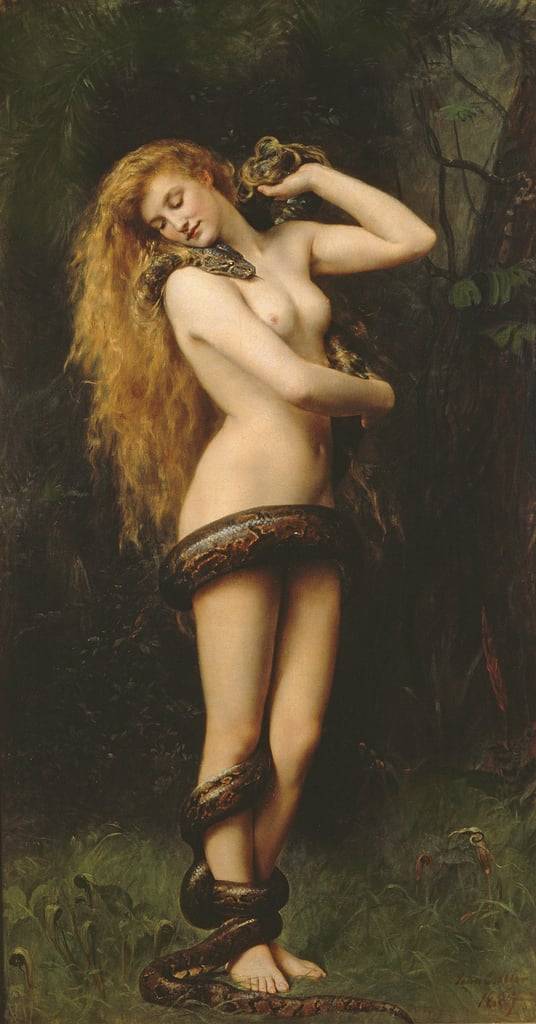
Crowley wishes his mom was this cool with snakes.
A good case can be made that Crowley genuinely likes the color red in addition to considering it demonically appropriate. I say this for three reasons. Firstly, because when he has a (limited) choice of (again, demonically appropriate) colors, he always chooses red. The marble of the desk in his apartment is not green or grey. He can have any color stitching on his gloves or lining of his jacket collar he wants, but it's always red. Secondly, it's not only red he chooses, it's almost always bright red.
We know Crowley's red isn't supposed to represent blood or violence, because we have another demon character whose use of red represents just that, and it's not the same red:
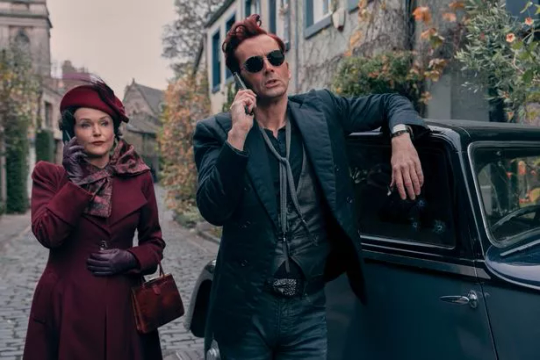
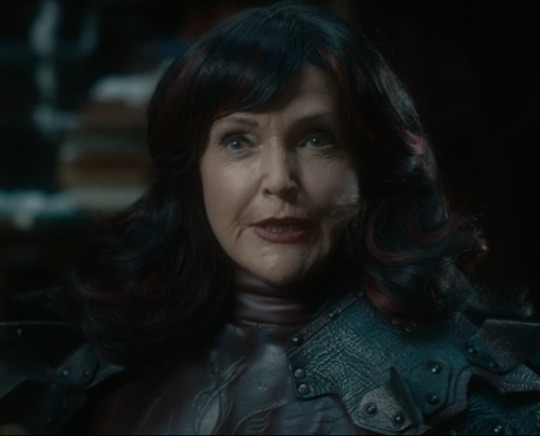
Compare Shax' oxblood and burgundy to
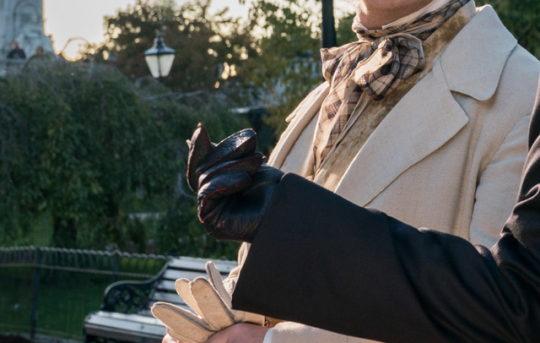
and
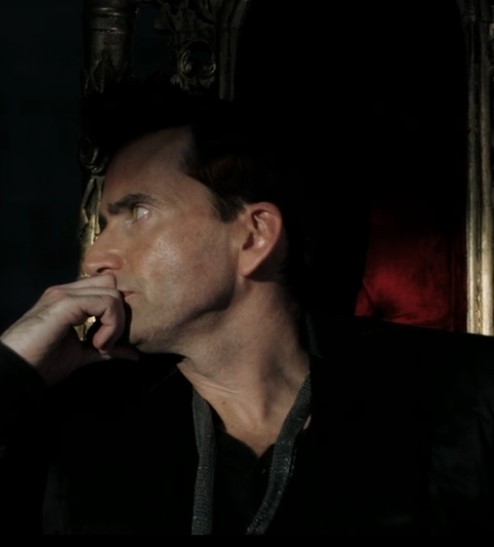
and
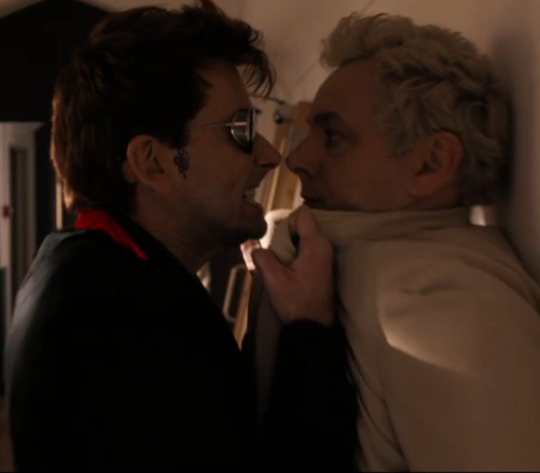
and
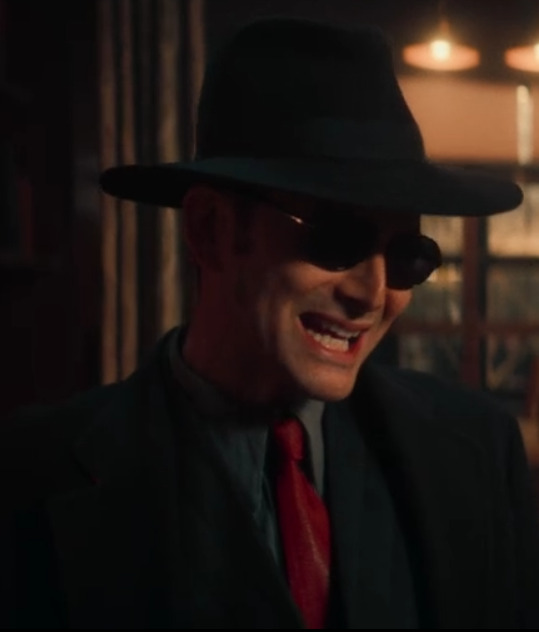
Crowley's red isn't just red, it's lipstick, cherry, crimson red. And in case we weren't sure that we should read this red as symbolizing passionate, romantic love:

Romantic symbolism aside, bright red is also the color of passion (romantic or otherwise), optimism, heat, vitality, life, (hell)fire, and warning.
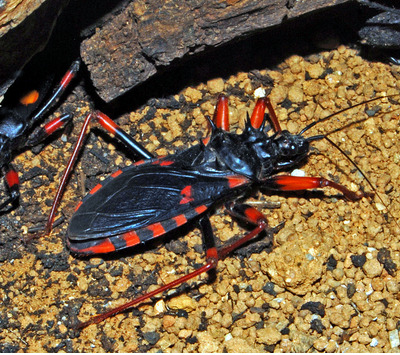
Red and black says don't fuck with Jack.
The third reason I think we can safely say that Crowley actually likes the color red is that he hides it. It's always tiny little touches, some of which you have to look for to see. (I still don't know where they snuck in the red on his Elizabethan habit, e.g.) And we know this color is a risk for him, and that he is right to hide it, because Ligur, who doesn't approve of any of Crowley's less-than-fully-demonic embellishments and may share Hastur's opinion that Crowley has gone native, comments on one of Crowley's more noticeably colorful items.
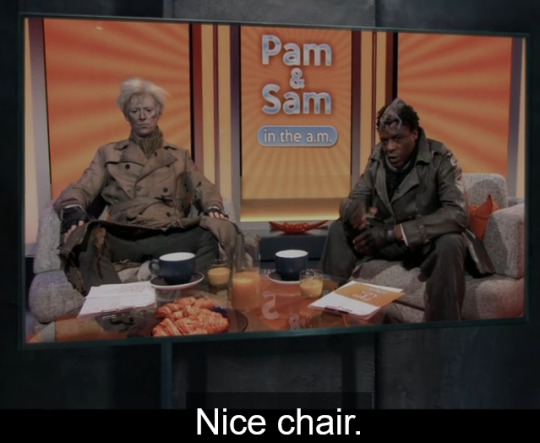
And I think the red tells us one more thing about Crowley, too.
Bright red is the colorest of colors, you know? When we can choose only one color to represent all colors, to represent colorfulness itself, we choose bright red (even in cultures where red symbolizes other meanings than it does in Western art).
Remember how Aziraphale gives Crowley's jacket a tartan collar when he swaps bodies with Crowley and impersonates him in Hell because Aziraphale feels the need to maintain some small secret token of his identity, some tiny unremarked sign of something he loves and thinks is beautiful, when he is down there alone in the gloom among enemies?
Crowley is down there alone among enemies every second of every day and night, whether he's in Hell or on Earth. And he's already had his identity stripped from him once. If you were someone who said
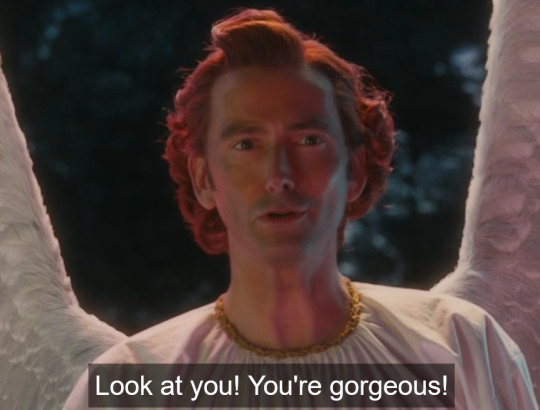
about this
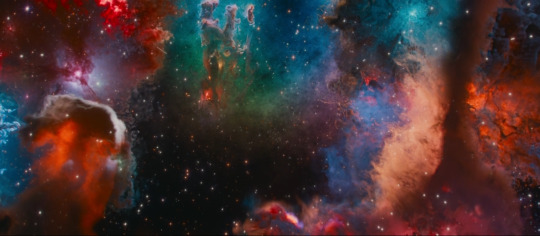
and then you got recruited by the fash downstairs bc the fash upstairs threw you out for not being fashy enough and you had to start wearing nothing but dark colors and more importantly had to hide everything that made you feel warmth or softness or joy, and that was it, that was the deal for eternity, but you could add one (1) little touch to everything you wore to remind yourself that there is some beautiful part of you left, something you loved once, that no one has yet been able to steal or brutalize out of you...what color would the stitching on your gloves be?
Lastly, Yellow represents Crowley to Aziraphale. I'm going to skip the chain of evidence for this bc I think it's obvious, but the way it's used also lends itself to some inferences supported in other areas in the show.
Here's where I think changing Crowley's hair to red from Book Omens' dark is a good decision in another way. Crowley always has red hair, and if he has any color in his clothes it's going to be red. Red is eye-catching; it always stands out, but it doesn't stand out as demonic. And yet the color Aziraphale associates with Crowley and calls "pretty" isn't red.
I suspect that when Aziraphale says he can make Crowley an angel again, Crowley hears "You're not good enough for me to accept you as you are, let me fix you" because these are words Aziraphale has said to him many times, and has meant some of those times. But

tells the audience differently. The color Aziraphale associates with Crowley, the color he calls "pretty," is the color of Crowley's only overtly demonic feature. Aziraphale doesn't love the angel he knew who isn't Crowley, he loves Crowley, the demon, the person he is now, his yellow demon irises.
Yellow appears in three other places in S2, and they're all symbolically significant, and in fact serve to establish another symbolic significance to the color yellow in addition to that of Yellow Is the Color of My True Love's Eyes.
One of them is a feather duster:

Crowley reacts to a feather duster like a cat confronted by an unfamiliar object
The other three are private conversations between Aziraphale and Crowley:

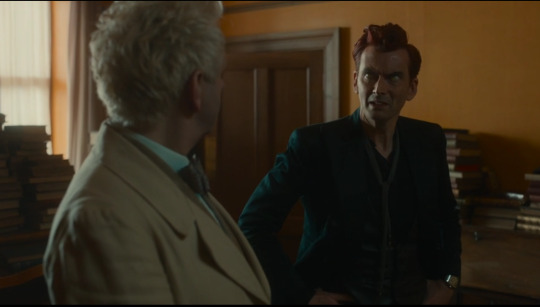

The walls that surround Crowley and Aziraphale when they speak openly about their situation and how they will handle it are drenched in yellow, and that is super interesting, because in Western color symbolism yellow is the color of fear. The archangel of whom Crowley and Aziraphale are both (rightly) terrified wields a tool the color of fear. The color of fear saturates the backdrop of conversations between Aziraphale and Crowley when they have to discuss their situation and their actions openly.
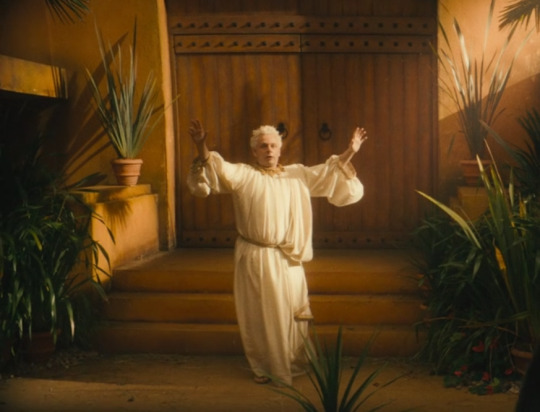
Remember how Aziraphale's voice shakes here?
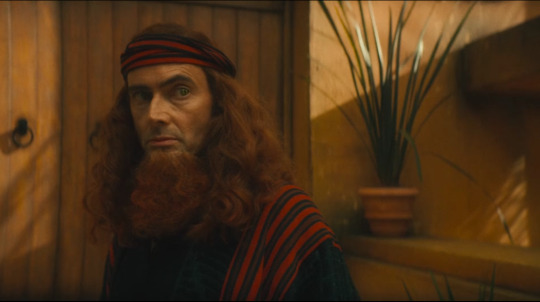
Crowley realizes the crows have just handed an angel evidence the angel can take to Hell and use to have Crowley killed
Even the Bentley, that clear sign of Aziraphale's love for Crowley, is also a yellow coffin enclosing him. For Aziraphale, thoughts of Crowley are always entangled with fear, because Crowley is not just Crowley, he is also Crowley's Fall.

And I think fear is what Crowley's eyes themselves represent. For Crowley, fear is now a fundamental part of his perception, his nature, his identity.
The angel Aziraphale once knew is not Crowley, and yet from what we've seen, the chiefest difference in character between this sweetheart and this mischief-maker--

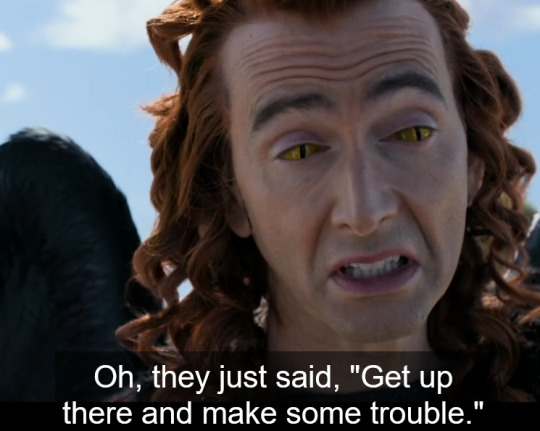
--is that the Starmaker does not know yet that he should be afraid, and the Serpent does. That knowledge and its fear has, shall we say, colored his view of the world.
Aziraphale learns that fear early by observing others rather than Falling himself, and knows enough that by the first time we meet him in the Before, he is already afraid.
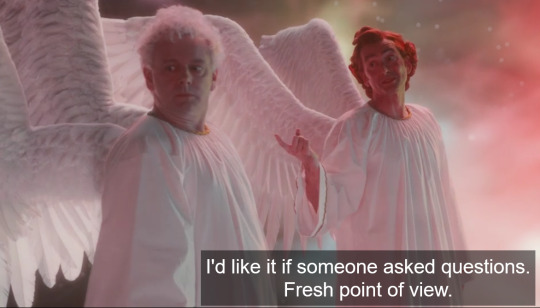
Pink was once symbolically equivalent to red; in modern Western color symbology it is a color of innocence, youth, beauty, and first love. Hashtag just sayin'.
The cruellest thing this suggests to me is that, rather than rebellion or his propensity to ask questions, rather than the knowledge of good and evil, the Starmaker's Fall was caused by his innocence. it wasn't the questions that were the problem: it was that he didn't know any better than to speak them out loud.
Y'all, Crowley and Aziraphale do not suffer from communication problems. Despite both being male-coded and British, they don't even seem to lack emotional intelligence. What they do have is a universe of silence and fear they have to communicate within and around. What they lack is the safety to speak and love freely. The true color of Crowley is crimson, but someone gave him those eyes, and Aziraphale either watched that happen or knew about it, and now Crowley covers himself in black--which btw is also the symbolic color for mystery and secrets--and only lets Aziraphale see him as he really is now, because Aziraphale won't judge him for his yellow eyes (or punish and forsake him for his questions). Because Aziraphale carries that fear with him too.
#good omens#good omens 2#good omens analysis#good omens crowley color analysis#good omens crowley color#crowley#good omens colour analysis good omens crowley colour#good omens colour#good omens meta#angel!crowley#starmaker
1K notes
·
View notes
Text
Talking about a single bill book page under here

The thing about this page is, for something that was supposedly ripped out, it doesn't really contain anything that strikes me as needing.... to have been... ripped out.
Sure, he talks about being lonely here and maybe that could be embarrassing to him, but it's not like he hasn't talked about being an outcast before, his entire about page has a section dedicated to his trials and tribulations with his peers when he was younger.
Additionally, there's many times in the journal where he seems to have written something he feels he shouldn't have. Though ripping that thing out isnt usually his method of choice. He much prefers to scratch things out.

Why couldn't the page have existed like this? Or even, if the entire thing truly is too embarrassing to have in your journal, why did you write it there in the first place?
It seems to me that the only reason this page was included with the other Bill pages was to set up the narrative of Ford's loneliness. (That within Journal 3 proper isn't really needed, because one can already ascertain that...). Doyalist reason? Sure, Alex is trying to set up his story. Watsonian reason? Naturally you turn it around and see it as Bill trying to set up his own story.
This page's existence in general isn't the only beef I have with it though. While we're meant to accept it on the basis that he ripped this out, Ford engaging with personal feelings, especially negative ones like this in such a blatant way is... unusual. I'd say he's much more prone to distracting himself away from that sort of thing with his work.
For the journal especially, this page would have to take place pretty early, as it's supposed to be pre-Bill. Which is weird, considering a later page in the original J3...

Of course, like I said, we the audience can understand Ford is lonely. And I'm not trying to say he doesn't know it himself, but he does not engage with it.
The thing about this page though, is that it's much more than just a single spot where Ford's own loneliness is mentioned. It's a turning point for the way Ford writes. Prior to Fiddlefords arrival, Stanford takes a few pages to introduce himself, then everything following is either an anomaly page or the occasional muse page. Like I said before, it's all very work-focused.
After Fiddleford comes to town, Ford is forced to feel the full extent how lonely he's truly been, and he starts to write a lot of pages of his and Fiddleford's adventures together, including his feelings during. (insert everyones favorite lines here:)


But he also starts to write about something else...

Over

and over

and over

again...
Fiddleford's renewed presence in his life really opened some mental-block floodgates in Ford's mind. From experience, sometimes you really aren't faced with how truly lonely you are until you are provided with some respite from it.
Again, I would like to say, it's not that I think he wasn't lonely before. He definitely was, and it's certainly part of why Bill was able to target him. But would he have written it out like that at that point in time? In the journal no less?
I dont really think so. I think he was doing everything in his power not to think or feel it.
And writing it down isn't really what I'd call conducive to that.
#bob investigations#this is more of an analysis than anything#book of bill spoilers#the book of bill spoilers#long post
201 notes
·
View notes
Note
I'm reading Ghost in the Shell right now and Tom just mentioned the lengths the yeerks had to go to in order to keep morph-capable controllers in line during feedings. I know you went into this in more detail during the last fic in the series as well, but I wanted to ask: is there a canon reason the yeerks couldn't just have fewer hosts than yeerks, and stick a 'temp' yeerk in the host's brain while the usual one is feeding?
I can think of some plausible reasons (host's brain needs time off to recover, yeerks can't switch hosts very often without difficulty, cultural objections to sharing bodies with their fellow slugs) and also meta reasons (more angst potential, more interesting this way). But I'm curious what your take on this is. I can't remember if they ever addressed it in-series
Oooooohh. I like this idea, and I would love to see it explored. If Yeerk One inches sloooowly out of the left ear as Yeerk Two inches into the right, then you're right that there could be almost no lag time at all between yeerks. For the morpher hosts especially, that would be dead useful.
Doylist (out-of-universe) speaking, I think we don't see this in canon because we need to see the horror of what the yeerks are doing to their hosts. And if hosts have 0m0s of ability to express what's going on with them, then it runs the risk of seeming like no big deal. Or like there's no meaningful difference between the voluntary hosts and the involuntary ones.
Watsonian (in-universe) speaking, I assume it's not used because of issues of privacy and — let's be honest — corruption. If Eeek 1234 is inside Alloran for a few minutes every time Visser Three needs to feed, then suddenly some random yeerk knows every one of Visser Three's secrets that Alloran knows. Eva knowing about Edriss's human kids gives her tremendous power over Visser One, and Eva's knowledge of the Empire later proves instrumental in the Animorphs winning the war. If some other yeerk is inside of Eva, then that yeerk has that level of intel and power over Visser One too.
184 notes
·
View notes
Text
So, I've gotten to the episode where Spock eats bacon, and I've been holding off on commentary on it because I hadn’t seen the episode because I didn’t have context, but now I don’t think I needed that much and neither do you. Spock temporarily becomes human, so to help indicate this, he snacks on bacon. There’s a reason this is an object of discourse, mostly for the Doylist reason, but there’s a Watsonian reason for discourse too.
Several subtle and unsubtle things about the Vulcans were influenced by Jewish culture, the iconic Vulcan salute especially. Leonard Nimoy was Jewish, and I don’t think I need to explain the kosher diet or where bacon falls on that. That’s why a lot of people are upset, but if that’s hard to grasp why, I have a secondary reason for it that may be the perfect analogy for why it’s worthy of ire.
Vulcans don’t eat meat. Whether it’s because of principle or that they’re just herbivores, I don’t know if the aversion to meat just goes away the second they'd stop being Vulcan. A vegetarian doesn’t eat meat because they believe it’s wrong, so for Spock to eat it without question requires bypassing those principles.
It speaks to the weird way the episode treats being Vulcan, as though all the culture of Vulcan is genetic instead of learned. Vulcans had to be taught how to be this way, to suppress their emotions, and I'd think that wouldn’t go away just because he’s red-blooded now, but one of the indications that he’s human now is that he can’t control his emotions. It’s like someone used the pop culture understanding of a Vulcan as the basis for the arc instead of actually knowing anything about them. It’s like Michael Burnham never happened.
On a secondary note, I had a hard time watching this episode because it’s a zany social hijinks episode, and that makes me cringe. I didn’t say it was cringe, but that it causes a physical reaction that I can’t help. I don’t like cringe comedy for this reason, because I'm autistic and can’t handle this kind of stimuli. I had to skip through Spock’s scenes in the second half because I was pretty sure it was going to suck. It’s like they decided to make an episode specifically unfriendly to the audiences that connect with Spock.
135 notes
·
View notes
Note
How do you think one should go when trying to "fix" the narrative or make it less angstier? Because when it comes to season 1, I feel like it's easier, but when it comes to season 2, you sorta have the impression that you HAVE to let all the events play up as they are even if you want to make Jayce and Viktor reconcile earlier. For example, Jayce could have tried to show Viktor the truth as early as episode 6, but he doesn't and instead blasts him. Same with episode 8. And it makes me wonder just what exactly Mage Viktor told him. Like did he tell him to let things go exactly like that or did Jayce just assume they should. And this is mainly a peev of mine, but to be honest, when I saw Puppet Viktor on episode 8, I genuinely assumed Singed had already healed Viktor and got baffled to see he only did after Jayce rejected him. So, how do you think things would've gone if Jayce had accepted Viktor? Albeit in a "Only if you listen to what I say and think REAAAALLLY hard if that's what you still want". The most I can think of the top of ky head is Ambessa being down an army and Singed being disappointed in Viktor once again not following his example. What do you think?
I'm going to assume this is for fanfic AU purposes because I'm not super interested in litigating how S2 "should" have gone.
As for why did Jayce not try to reason with Viktor in 2.06, I think we have to infer that it wouldn't have worked.
The theory I go with is that the Hexcore was still controlling Viktor too completely at that point. Jayce could have talked until he was blue in the face or he could have used touch to show Viktor directly what the future would hold, it wouldn't matter.
I suspect that Jayce knew that even if he had gotten through to Viktor, Viktor wouldn't have had the power to throw off the Hexcore's influence either (we're going pure Watsonian here, Doylist the explanation is: we wouldn't have a story).
So at that point, Jayce doesn't tell the future through touch or words to Viktor because he needs Viktor but more important the Hexcore to be ignorant of the events that will be needed to truly destroy it for good.
My guess is that the sequence of events had to go like this:
Even if Viktor could be convinced at the commune, it wouldn't matter because the Hexcore was more powerful than him.
Viktor would need an alternate source of power in order to cast aside the Hexcore's influence.
The only sequence of events that get Viktor to a point where he wants to and can separate himself from the Hexcore and then destroy it are what we see in canon.
It requires 1) Viktor and the Hexcore to gain the power of the Anomaly that resides at the base of the Hexgate tower. Jayce's attempts to remove the cores and talk to him were only stalling actions for the critical moments needed to buy time for Ekko to wake up because
2) Ekko needs to throw a bomb at Viktor's head made from an Anomaly from an alternate universe that Viktor has no awareness about, so it truly surprises him AND the Hexcore.
The Anomaly cracks the outer shell around Viktor, the Machine Herald, which is actually a manifestation of the Hexcore's influence over Viktor.
Then Jayce's pleas and the information about the future can get through to Viktor, through the crack in the Hexcore's influence.
Then, with the power of the Anomaly and the rune in Jayce's wrist (which is in turn powered up by Wizard Viktor), Viktor and Jayce together can withdraw the Hexcore's influence from all the people who have been assimilated (thus rendering the puppets immediately inert), withdraw the tendrils of influence from the people who have been captured, and use the power of the Anomaly to erase the Hexcore from existence. Without that exact sequence of events, they wouldn't have the power to do so.
Had Jayce tried to warn Viktor in 2.06, the Hexcore would have realized the Anomaly has the power to destroy it. So Jayce couldn't tell him about the Anomaly then or the Hexcore would have avoided going there. The Anomaly gave power to Viktor as well as the Hexcore.
That said, it's still a very narrow path to victory, which is one reason I think Jayce still tried to tell Viktor not to go to the Hexgates, perhaps knowing it would only goad Viktor to go there sooner, as was required by the plan, OR perhaps he truly hoped against hope that he could talk Viktor out of this inevitable sequence, like when he tried to reason with him at the base of the tower, only to be shown over and over that Wizard Viktor is right, there is no way to get through to him before Ekko's bomb goes off and separates Viktor's consciousness from the Hexcore's goals even by a fraction.
Also remember, Jayce's promise to Viktor, the one he references in his speech, was that he would destroy the Hexcore. All of this, from the beginning, has been about destroying the Hexcore.
Viktor once free of the Hexcore's influence thanks to the bomb and the realization brought on by Jayce's plea, tries to destroy and withdraw its influence alone. Then Jayce steps in, and they destroy the Hexcore and withdraw its influence together.
I think a lot of people lost track of the fact that the Hexcore is embedded in Viktor's chest and still active throughout S2. One reason Viktor warned that it had to be destroyed is that he knew it had taken over his mind enough and was physically controlled him enough already, just from the transformation of his leg, that he knew he couldn't do it himself, the Hexcore would stop him.
This also explains why Viktor isn't trying to destroy the Hexcore anymore in S2 and why he suddenly believes in Glorious Evolution. He knew before it took him over that he wouldn't have the strength to fight it. His look of disappointment at Jayce in 2.02 is, I'd argue, the last flicker of his awareness that he's doomed to carry out its will, now that Jayce has made it a part of him. He has been taken over by it through Jayce's attempt to save his life.
Anyway, I hope this answers your question!
73 notes
·
View notes
Text
Stephanie Brown: The Girl Robin, The Doomed Robin
Stephanie Brown is fired as Robin in Robin #128 (1993). I think there is strong evidence that Batman saw her time as Robin as temporary, and that she was always going to be fired, excuse or not, in Robin #128 or not. Just as soon as she became more trouble than she was worth, or as soon as she was no longer necessary.
I want to look at why (even from a Watsonian perspective) Stephanie Brown as Robin was doomed from the start. Here's Why I think this:
1. The False “Skills and Talent” excuse is reaffirmed and reutilized
After the period of time where Stephanie is sanctioned as Spoiler by Batman, she is ‘fired’ for the first time in Gotham Knights #37.
Batman does not tell Stephanie she is fired, he just never reallows her entry into the Batcave after locking everyone out during Bruce Wayne: Murderer. She has to track him down and ask what’s going on to find out he dropped her like she was nothing.
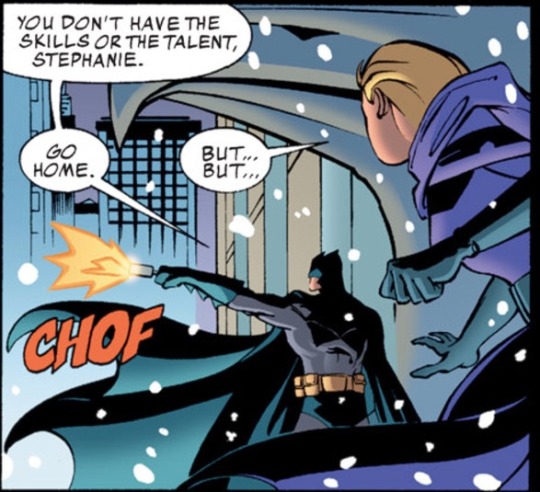
Gotham Knights #37 (2000)
He tells her it’s because she lacks the “skills or talent”. Is this true? Well… no, not reallyZ Or at least, we have very few good reasons to believe that this is Batman's real reason he fires her, especially in the face of all the other better substantiated explanations the text supports and states. As I’ve analyzed before, there’s strong evidence Batman fires her because he has reunited with his estranged team no longer needs her to make himself stop feeling lonely. Additionally, some part of her firing is because she reminds him too much of his dead son. (I highly recommend checking out the corresponding posts if you are interested in why)
Point is, I’ve already argued how the “skills or the talent” line is pretty much an Extremely bullshit excuse he only tells Stephanie to justify himself to her. But what does that have to do with Steph’s run as Robin?
Well, the idea that Stephanie lacks “the skills or the talent” comes up again. In fact, the exact words “skills and talent” are directly repeated when she is first sanctioned as Robin. And its very telling how they are used.
Let’s look at that moment.
Alfred is trying to dissuade Batman from making Stephanie Robin, and Batman is defending his choice.
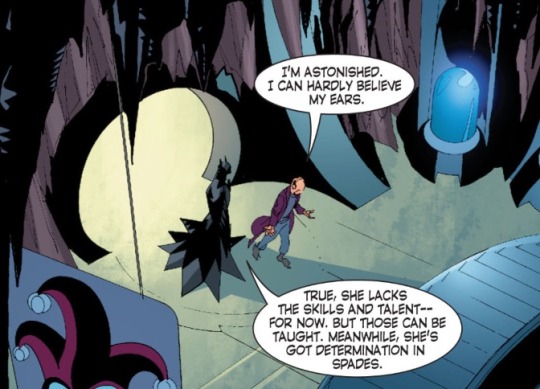
Robin #126 (1993)
Batman claims once more that Stephanie does not have the “skills and talent”.
By doing this, Batman is reaffirming his largely facetious rationale he tells Stephanie when he he fires her the as Spoiler. By refusing to abandon this as an excuse, and repeating it now, he is reaffirming his own validity in that moment, his correctness is dropping her in the way he did.
But its also weird. If he fired her as Spoiler because he claimed she lacked “the skills or the talent”, why is he using her lack of “skills and talent” as a reason why she should be Robin?
Batman says she can be taught the “skills and talent” he claims she currently lacks. Was that magically not true when he fired her for lacking those same “skills and talent” in Gotham Knights #37?
This straight contradiction is weird. What it does is key us in to the fact that Batmans spoken explanation about “skills and talent” for whether or not he wants Stephanie on his team is not really based off of any consistent logic about her skill level.
This is backed up by something else he says to justify this choice in that very same comic.
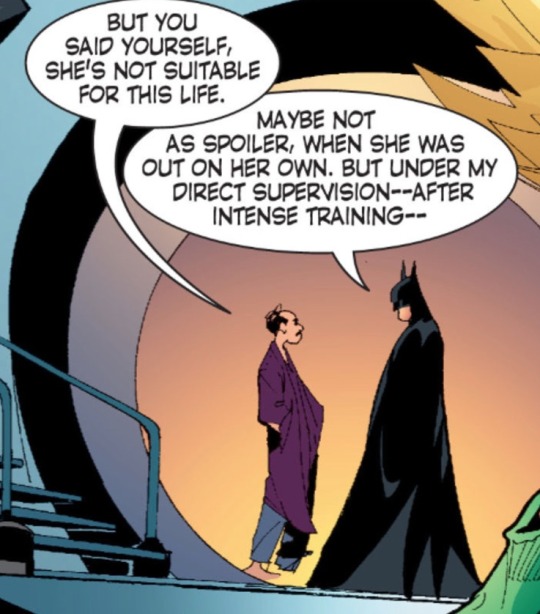
Robin #126 (1993)
Again, this logic makes no sense with his past actions. If the issue with Stephanie being a vigilante is she is “out on her own” without being “under [Batmans] direct supervision”, then why did he fire Stephanie without a proper reason when she was sanctioned as Spoiler and was under his supervision, when he was training her?
Again, Robin #126 creates entirely contradictory logic for Batman, and calls out the specific peculiarities of this through the repetition of the “skills and talent” phrasing.
These moments establish right off the bat that Bruce Wayne’s spoken rationale for hiring Stephanie as Robin is completely illogical.
Batman reusing the “skills and talent” justification also reaffirms his willingness to justify his first firing of her, and sets up the potential for him to use the exact same dumbass excuse that he used the first time.
This all shows that Batman is willing to use his bullshit excuses to fire or hire her indiscriminate from her actual personhood depending on what is most useful for him. And it shows Batman is retaining and reaffirming his so called “logic” for firing her in Gotham Knights #37, therefore leaving open the opprotunity for him to reuse the exact same excuse if he felt like it.
Chiefly, the reference to Gotham Knights #37 and her orginal firing asks us to compare her time as Robin to the first time she was hired and then fired, and examine why. And if the first time Steph was sanctioned was absoluely arbituary, what does that say about what might be true about her time as Robin?
But wait! There’s more.
2. Alfred’s allusion to Steph as an instrument to get Tim back as Robin
Alfred confronts Batman with this idea that Bruce might be trying to “lure” back Tim as Robin by making Stephanie Brown Robin.


Robin #126 (1993)
Regardless of how this scheme is supposedly meant to work, this idea is presented to the reader from Alfreds point of view. Alfred, who oftentimes serves as a vantage point of morality and reason in contrast to Batmans single-mindedness and irrational obsessions. Additionally, the language Alfred uses certifies how serious of an option this is. Alfred doesn’t just ask Batman to “clarify” or “say” he isn’t hiring Steph as Robin to lure Tim back, Afred asks Batman to “promise” it. The word “promise” implies that this isn’t just a far off vague possibility that Alfred is discussing, but a distinct and worrying probability Alfred is detecting.
And damningly, Bruce does not answer Alfreds plea. All he would have to say is one word, ‘no’, and he would banish this as a possibility from Alfred's mind and largely deny this reading from the narrative. But, as we see, he doesn’t deny what Alfred says. He ignores the direct question, and he turns his face away. Look at how as he speaks only a sliver of his face is visible in the proceeding panel to Alfreds question.
This places Batmans silence in an even more damning light. He can’t even look Alfred in the eyes, he is already looking away as he speaks, as he ignores Alfreds question entirely.
You can decide whether or not you find this moment entirely convincing, whether or not you believe Alfred is correct in his assessment. But at the very least, this moment asks the reader take seriously the possibility that Alfred is right: that Batman has made Stephanie Robin in order to try to get Tim Drake back as Robin.
But wait! There’s even more.
3. Stephanie Brown and the lack of information given to her as proof of the temporariness nature of her time as Robin
Bruce Wayne’s distrust of Stephanie is a long running theme of their relationship. It’s brought up consistently during the time she is sanctioned as Spoiler.


Robin #100 (1993)
And it drives a wedge between her and Tim romantically, before she is eventually told Tims real identity.
This isn’t just a vague distrust, the main way it manifests is through the secret, vigilante related information which Stephanie does not have access to.
She is denied knowledge, specifically secret identity related knowledge, consistently. Not having Stephanie cued into all of the information the rest of the team has when she is Spoiler is a tactical decision which isn’t exactly cruel or necessarily especially strange on its own. But this distrust with sensitive information, (most primarily Batman’s true identity as Bruce Wayne) is extremely strange when Stephanie is made Robin.
The “Robin” identity up until that point is invariably tied to Bruce Wayne.
In the cases of every Robin beforehand, (in most interpretations and tellings) the meeting of Bruce Wayne and the meeting of Batman occur in extremely close proximity to one another, and the full picture of Bruce Wayne’s secret identity does not remain a total secret for very long, and in NONE of these tellings is that information not known when any of the other Robins put on the costume. The Robin and Batman relationship is also just generally tied strongly to Bruce Wayne as an identity. Dick Grayson and Jason Todd are ward and adopted son respectively of Bruce Wayne specifically, and Tim Drake lives with Bruce Wayne in the manor. They all interact with the man and the mask.
Stephanie breaks this pattern. She is the only Robin who doesn’t get to know his real name or see his face. (Her relationship with Batman mirrors the early Batgirl/Batwoman archetype much more- a character who interacts with The Batman, but isn’t alllowed know him as Bruce Wayne)
The text of Robin #126 points out her lack of knowledge specifically, but explains it away as temporary.

Robin #126 (1993)
We are told in this panel that it is a temporary matter, that of course Stephanie will eventually get to know Batmans identity, she just has to prove herself first!
This screams bullshit to me. Stephanie has worked him as Spoiler for a considerable amount of time in the past, and after more time still she’s been made Robin, but this probation until she gets to know the “big secrets” is somehow necessary where it never has been before? I don’t really buy it, but you are certainly allowed to take him at his word.
Anyway you slice it, distance from important information, the “big secrets” is a prevailing aspect of Stephanie’s time as a vigilante.
And it finally comes to a head in War Games (2004). (I won’t break down the entirety of my thoughts on War Games here for the record, but trust me, they are numerous and vitriolic)
This idea of Batman's distrust in giving Stephanie sensitive information is hammered in over and over during War Games. For instance, the first issue of War Games contains several small allusions to this idea.



Batman: The 12 Cent Adventure (2004)
This only becomes more overt as War Games continues, specifically when Stephanie meets and speaks with Catwoman.

Catwoman #34 (2002)
Catwomans internal monolouge points out the specific strangeness of Robin Stephanie not knowing who Matches Malone is, she presses on how this is especially strange for someone using the Robin mantle, alluding to what I touched on earlier, the unqiuess of Robin Stephanie’s relationship with secrets and secret identities compared to every other Robin.

Catwoman #34 (2002)
We get another example of this where Selina once more points out information that Selina, a longtime friend, enemy, and lover of Batman, assumes Robin would or should naturally know, which we discover Stephanie was not privy to during her time as Robin.
Thats two examples where Stephanie’s lack of knowledge about secret identities (which there is no real reason for her not to know) is specifically pointed out to be strange and uncommon in relation to what the “Robin” mantle denotes, a level of trust which is simply not present.
But what am I getting at here? What does this distrust mean?
Well, if you ask me, it’s evidence that Robin, for Stephanie, was always intended by Bruce Wayne to be temporary. You don’t give sensitive information to temporary members, to the people who aren’t long term, who aren’t meant to stick around, who are going to be dropped, just like Bruce dropped her the first time.
This feels especially true given the fact that this sensitive information she is not told, in the case of catwomans secret ID and who Matches Malone is, isn’t particulary sensitive at all and the sort of information that it’s clearly expected a Robin should know.
To me, the fact that all of that information is withheld from Steph, and especially the fact that she doesn’t get to know “The Secret” is indicative of the fact that she was always going to be fired as Robin, that she was always meant to be temporary.
Between the “skills and talent” reiteration, Alfred’s explicit reference to the idea that Batman was using Stephanie to lure Tim back, and the information which is withheld from Stephanie in direct contrast to every previous Robin, there is substantial evidence that Bruce Wayne always intended for Stephanie Brown to be a means to an end as Robin.
If we take Alfreds word, this temporariness is because Stephanie served as a cog in Bruce’s larger scheme to lure back Tim into the role of Robin.
Does this mean Batman though of her as temporary the entire time she was Robin? No. Does that mean he was doing this maliciously? Also no. Did he even know he was doing this distancing consciously? Hard to say.
It also doesn’t mean he didn’t have sweet moments with Stephanie as Robin, it doesn’t mean he didn’t change his mind about using her to lure Tim back (if that was his plan at some point), and it doesn’t mean he never cared about her.
But I think it's entirely fair to say that at least some part of Bruce Wayne was just fine with using Stephanie the same way he did when he sanctioned her as Spoiler and then dropped her. That at least some part of Batman was retaining these excuses, keeping up those walls and secrets because at least some part of him knew she wasn’t supposed to last. That some part of him did this so that he would be able to get rid of her guilt free as soon as it became more beneficial for her to get gone.
#stephanie brown meta#bruce wayne meta#stephanie brown#batman#bruce wayne#Alfred Pennyworth#Tim Drake#robin 1993#dc comics#mine
103 notes
·
View notes
Text
GG: ok, so what is the plan? […] CG: OK WELL THE MOST IMMEDIATE POINT OF BUSINESS IS CG: YOU SEE THAT GLOWING BLUE SCREEN BEHIND YOU? […] CG: YOU NEED TO TURN THAT FUCKING PIECE OF SHIT OFF.
The Fourth Wall again?
So far, it's really only been relevant to the non-canonical Hussie interludes, but maybe it’s dangerous for Watsonian reasons, too. Gamzee certainly seems interested in it...
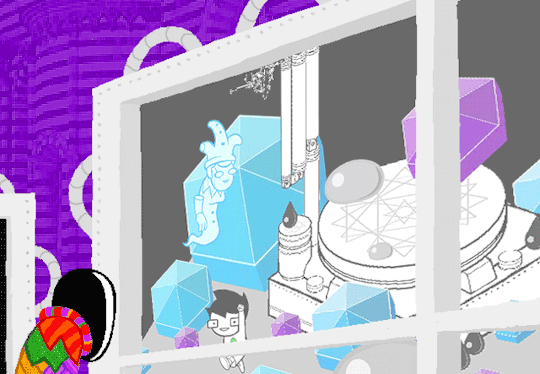
It did belong to Jack originally. Maybe Derse can still make use of it, so it needs to be disabled before someone like DD gets any clever ideas.
CG: I'M NOT GOING TO SAY MUCH ABOUT IT. CG: BUT SUFFICE TO SAY THERE ARE JUST SOME THINGS YOU DON'T WANT TO SCREW WITH. […] CG: THEY ARE FORCES WHICH IF HANDLED RECKLESSLY WILL NULLIFY THE BASIC ABILITY OF INTELLIGENT BEINGS IN ALL REAL AND HYPOTHETICAL PLANES OF EXISTENCE TO GIVE A SHIT.
Oh, I get it. Karkat’s taking a little break from canon himself, and explaining to the audience that too many meta shenanigans would eventually ruin the story.
I’m absolutely in agreement with this. A fourth-wall break in the wrong place could completely ruin the comic’s dramatic stakes. This is a goofy comic, and we have fun here, but going full Deadpool would tear the plot to shreds.
CG: […] MY ROLE AT THE MOMENT IS TO ACT AS A SORT OF GO BETWEEN FOR YOU AND YOUR FUTURE SELF CG: TO HELP ALONG THE PROCESS OF MAKING THESE PLANS CG: WHILE YOUR FUTURE SELF IS DELIBERATELY VAGUE ABOUT SOME STUFF SO AS NOT TO "JINX" THE CONCEPTION OF THE IDEAS IN THE FIRST PLACE I GUESS?
I like this idea. It allows Future Jade to guide her past self’s actions, but filters her guidance through a layer of indirection. Present Jade will be getting some help, but she'll still be able to come up with her own original ideas.
Jade really doesn’t want her plans to be stable-looped into existence, and I can get behind that sentiment, too.
CG: MEANWHILE TIME IS KIND OF RUNNING OUT HERE, WHERE I AM CG: WE'RE COUNTING DOWN TO SOMETHING CG: SOMETHING LOOMING ON THE TROLLIAN TIMELINE AND NO ONE KNOWS WHAT IT IS CG: AND MY TEAM IS KIND OF FALLING APART CG: I'M COMPLETELY LOSING TRACK OF EVERYONE AND WHAT THEY'RE DOING.
It's been a while since we've done a Veil roll call, actually. Let's give it a whirl.
Karkat is coordinating with Jade on what may or may not become the Scratch plan, and trying to keep tabs on his deteriorating team.
Vriska and Terezi are fighting a proxy war using John and Dave respectively.
Aradia has exploded, and the status of her ghost is currently unknown.
Kanaya is trying in vain to dissuade Rose from the trajectory that Scratch and the Gods have set her on.
Gamzee has recently developed a hatecrush on Dave. He also has some huge hidden importance to the comic, and he’s going to be attacked close to the end of the countdown.
Eridan is planning to confront Jack with his 'awesome' new Science Wand.
Tavros is on his way to confront Vriska and there's like a 98% chance she's going to paralyze him again.
Feferi is consorting with monsters in her dreams. She's also destined to be killed, but her assailant is currently unknown.
The only trolls who (as far as we're aware) aren't up to something are Equius, Nepeta and Sollux.
150 notes
·
View notes
Text
More thoughts on Secunit 3!
One thing Martha Wells does to distinguish Murderbot’s and Three’s narrations is to make Three’s present tense.
From a Doylist perspective, it’s surely because both narrations are first-person and the readers need to know who’s who immediately without getting confused. There’s ALREADY MB and MB 2.0 and a THIRD past-tense first-person narration would surely be confusing. This way the reader can immediately clock whether the Murderbot(s) or Three are talking.
But from a Watsonian perspective, I think there’s an in-character reason too? MB gets its emotional framework from fiction, like books and TV shows and movies, which tend to be narrated in the past tense if at all. Whereas Three didn’t watch thousands of hours of serials - it’s a person experiencing new weird things, and I feel like that’s reflected in the present-tense “oh shit I guess this is happening now” narrative voice.
I dunno. I just like it as a fun character touch.
139 notes
·
View notes
Note
(Sorry if this sounds mean) If you’re ace why are you looking for mind control erotica? This isn’t a bad faith question, as someone who’s aro but not ace I’m genuinely curious. Maybe expounding on it would help your followers point you at new things?
Also have you read Human Domestication Guide? It’s very mind controlly, though it does have pet stuff if you hate that or whatever.
Short answer: it's complicated.
So to answer in reverse order: I have read some HDG stories: not enough to remember what I read, but in general I like them. And petplay doesn't bother me. So I'll probably read more in future, it's just that it never triggered that "I should read all of this!" urge in me. Which isn't an indicator of how much I like it/the quality of it, that's just a thing that sometimes happens to my brain.
As for why I'm reading mind control erotica despite being asexual... It's complicated (as you might guess).
Basically I'm asexual in the "not attracted to men or women (or anything else/between)" sense. I don't experience sexual attraction, at all.
But that's only one part of sexuality. It may be the primary part for allosexuals, but it obviously can't be for me. I'm still interested in some sexual things, and I'm interested in them for sexual reasons, but it's just that those reasons are never "this person is hot" or "this sex is hot".
Like, not to give a complete listing of my kinks or anything, consider basic rope bondage as a fetish. You could look at the fetish from multiple angles:
It's sexy getting tied up, because of the physical sensation of being tied up.
It's sexy to be tied up, because you don't have control.
It's sexy to tie someone up, because of how they look tied up.
It's sexy to have someone tied up, because you have control and they don't.
It's sexy to have sex while tied up, because you can't resist it (in the scene. This is fantasy, there are safewords)
It's sexy to fuck someone tied up, because they can't resist (in the scene, fantasy, safewords)
And then in fiction you can do the last two minus the watsonian-bdsm: it's not a scene. (I won't discuss this further because discourse)
Only 5 and 6 really need sex itself to be a part of it. You can have the eroticism of bondage and no one has sex, or needs to be attracted to anybody.
I don't have a huge amount of experience here, but from what I've heard this isn't that uncommon in the bdsm community: there's plenty of people who show up at bdsm events solely for "non-sexual" tying/getting tied.
Anyway, once you understand that you can have a kink (even one that seems sexual) for reasons other than sexual attraction/sex* itself, you can probably see why an asexual person might still want to read about it.
Also there's elements of, like, exploration of personal impossibilities? As jms said:
So I cannot forgive. Which makes the notion of writing a character who CAN forgive momentarily attractive...because it allows me to explore in great detail something of which I am utterly incapable. I cannot fly, so I would write of birds and starships and kites; I cannot play an instrument, so I would write of composers and dancers; and I cannot forgive, so I would write of priests and monks and Minbari...
It can be interesting reading stories of people doing things you can't for reasons you never experience, obeying urges you don't have.
* "sex" is also a difficult thing to define, because especially in BDSM terms it gets very fuzzy. What things count as sex? Generally when I say like "they're spending too much time on the sex" or "the mind control is just an excuse to get to the sex", I'm defining sex as something like "some kind of insertion/licking/vibrating for sexual purposes", when many allosexuals (especially, uhh... What's the word for non-bdsm people? Them) would define it more narrowly, and many BDSM kinksters would define it more widely, including a lot of the things I'm not here: I've heard people call getting tied up or impact play as sex, for example.
Anyway you'd think this sort of perspective I've got on erotic fiction, where I'm here for the non-sex sexual fetish things, would be more common? After all, I'm talking about literature here. I tend to associate the allosexual attraction urge as a visual thing: this person looks sexy, so you experience sexual attraction towards them.
I can see how that'd work if you're talking about visual mediums: movies and photos of real people, even drawn images, but this is just words. I guess maybe people without aphantasia can imagine how someone looks from their description, and can experience some attraction based on that? I don't know. I've never really experienced attraction to written characters, so I can't say how it works. Feel free to enlighten me, anyone who does.
But you can definitely tell reading erotica which stories are "this is a sexy story because it has sexy people in it doing sexy things (sometimes kinkily)" and which are "this kink is the primary focus: any sex they have is in service of the kink, or is just a momentary distraction from the kink". I prefer the latter, by far.
Anyways, I think maybe I'm giving everyone a slightly misleading impression of how much I'm into mind control. It's more that I've found a few stories that actually were interesting to me for a couple reasons (first person submissive perspective, rules-based mind control, some worldbuilding) and then I've been looking for other stories that explore the same ideas as well (or better: the particular ones I liked had a little too much bimboification focus for me, which isn't one of my kinks) and failing. Thus I complain a lot about not being able to find the sort of stories I want.
Which, you know, makes sense? I'm an asexual reading through porn. Despite my explanation in this post, this is still not a great fit for me, so of course I'm disappointed. It'd be like if I was scrolling through a football site and not liking football, complaining about how much sports focus this site has. It's a little silly, you know?
But I'm a lot silly, so I continue.
120 notes
·
View notes
Note
Hey, I don't know if you've already answered this (and this may be a weird question lol) but why did Hydra just let Bucky's hair grow long? Why didn't they just cut it? I've seen you do other metas and stuff like that (which I love, you're a great writer!) So do you have any ideas?
Aww thanks for enjoying the other metas 💕
That is a very interesting question that I’ve never thought much of 😅
From a Doylist perspective, the Winter Soldier arc was published in 2005-6. Ed Brubaker was born 1966. Men having long hair became more acceptable and even fashionable from about the 1970s (ie Brubaker’s formative years), and that style carried over to the late 1990s (or, if you’re like me who was in the JPop fandom, it was still popular for most of the 2000s). Longer hair in men was generally seen as subversive and cool, or untamed and unkempt, which were descriptors that would have fit Bucky’s reappearance in his new persona. It was also a good way of indicating that time has passed and his character has changed significantly. One other thing is, when it comes to 2D art, long hair flows, ie it’s easier to express dynamism, which is why so many superheroes wear capes. I believe (not having read the actual comics) Bucky’s role changed in The Winter Soldier run from a pure sidekick to something closer to an antagonist and partner, so the more distinctive character design reflects that too.
From a Watsonian perspective…I guess men’s short hair can be somewhat high maintenance in that you kind of have to trim it once a month at least. Who knows if the serum affects the speed of hair growth as well, because if it does then maybe he needs more frequent trims and it just gets long if they miss any. Presumably, given his history, he’s also not an easy customer to approach with a sharp implement, especially not that close to his face. And they’re always in such a hurry to pack him back in the cryo tube or to get him prepped for his mission that it just gets missed until it really gets in the way.
The other possibility is that the longer hair also changes his face shape substantially speaking as someone who didn’t recognise Bucky when the mask came off. It makes his face more angular and the shadows deeper. It probably stops his memories triggering as easily when he sees his own reflection. It serves to erase his original identity, along with his new “name” (although we have no evidence that he knew he was called the Winter Soldier while he was still brainwashed), new uniform and the bionic arm.
The third reason is that the long unkempt hair could be used as a psychological tactic. It’s emasculating and demeaning, especially for someone born in the 1910s and normally known to be well-groomed and tidy. It’s an element of control over his bodily autonomy that he cannot change without them allowing it or at least giving him access to implements to cut it. It contrasts him with the other soldiers, including the other “Winter Soldiers” we see in CACW, who are allowed to sport typical masculine haircuts, and serves as a continual reminder that he is “other”, if not considered somewhat subhuman.
So that’s my two boring cents. I wonder if anyone else has other ideas.
131 notes
·
View notes
Note
So, I know the Doyalistic reason is "don't think too hard about it" and/or "don't count promotional materials as canon," so I figured it's time to ask this fandom's resident Watsonian Explanation Generator.
There is some evidence that Bill doesn't actually need your permission to invade your mind, he just needs the handshake. In the actual show, we mostly see him use trickery to get people to do what he wants, but in materials like "How Not to Draw Stan" he literally crawls his way into position and forces a handshake that way.
So, in the Fearamid, with Ford chained up and completely at his mercy, why do you think he didn't just... take his hand? It wouldn't be hard.
left to my own devices I'm honestly most likely to say yeeeah, unless this somehow is built into lore later on and we get an actual canon "Bill escapes to reality" plot, the How Not to Draw Stan clip is only semi-canon and not a good representation of Bill's actual abilities.
but god, how can i resist a call on my Watsonian Explanation powers? that's like my bat signal.
so okay if we want to finagle a watsonian explanation for Bill forcing a handshake while justifying why he didn't just do that in canon:
maybe the other person doesn't need to AGREE to a handshake; BUT they need to initiate it. Bill can't just grab somebody's hand; they have to move their hand into him. In TBOB Bill says he can invade anything with neurons; maybe (at least for living beings) the neurons in someone's arm need to be actively firing—i.e., if they're moving their own arm—in order to channel Bill from their palm into their brain. Which is why he can't just seize somebody's hand to force a shake.
And notice that throughout the penthouse scene and the torture scene, Ford almost always keeps his hands balled into fists. Sure, you could say that's because he's mad as hell; but you COULD say maybe it's to prevent Bill from putting himself into the path of Ford's arm while he's gesticulating and cheating a handshake.
Now—this """theory""" is thin as hell. But I think it's as good as we're gonna get with the canon we have at hand lmao.
99 notes
·
View notes